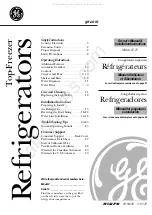
68
➢
Whole poultry must only be filled immediately before cooking to avoid food
poisoning.
F
ISH AND SEAFOOD
➢
Whole fish and fillets should be used on the day of purchase. Until required, they
should be stored in the fridge on a plate which is covered with plastic wrap, waxed
paper or foil loosely.
➢
If storing overnight or longer, take particular care to select very fresh fish.
➢
Whole fish should be rinsed in cold water to remove loose scales and dirt and
then patted dry with paper towels. Place whole fish or fillets in a sealed plastic
bag.
➢
Keep shellfish chilled at all times. Use within 1
–
2 days.
P
RECOOKED FOOD AND LEFTOVERS
➢
These should be stored in suitable covered containers so that the food will not
dry out.
➢
Keep for 1-2 days only.
➢
Reheat leftovers
once
only and until steaming hot.
C
RISPER
24
➢
The crisper is the optimum storage location for fresh fruit and vegetables.
➢
Take care not to store the following food at temperatures of less than 7 °C for
long periods: citrus fruit, melons, pineapple, papaya, passion fruit, cucumber,
peppers, tomatoes.
➢
Undesirable changes will occur at low temperatures such as softening of the flesh,
browning and/or accelerated decaying.
➢
Do not refrigerate avocados (until they are ripe), bananas and mangoes.
F
REEZING AND STORING OF FOOD IN THE FREEZER COMPARTMENT
25
➢
To store deep-frozen food.
➢
To make ice cubes.
➢
To freeze food.
24
Depending on model.
25
Depending on model.













































